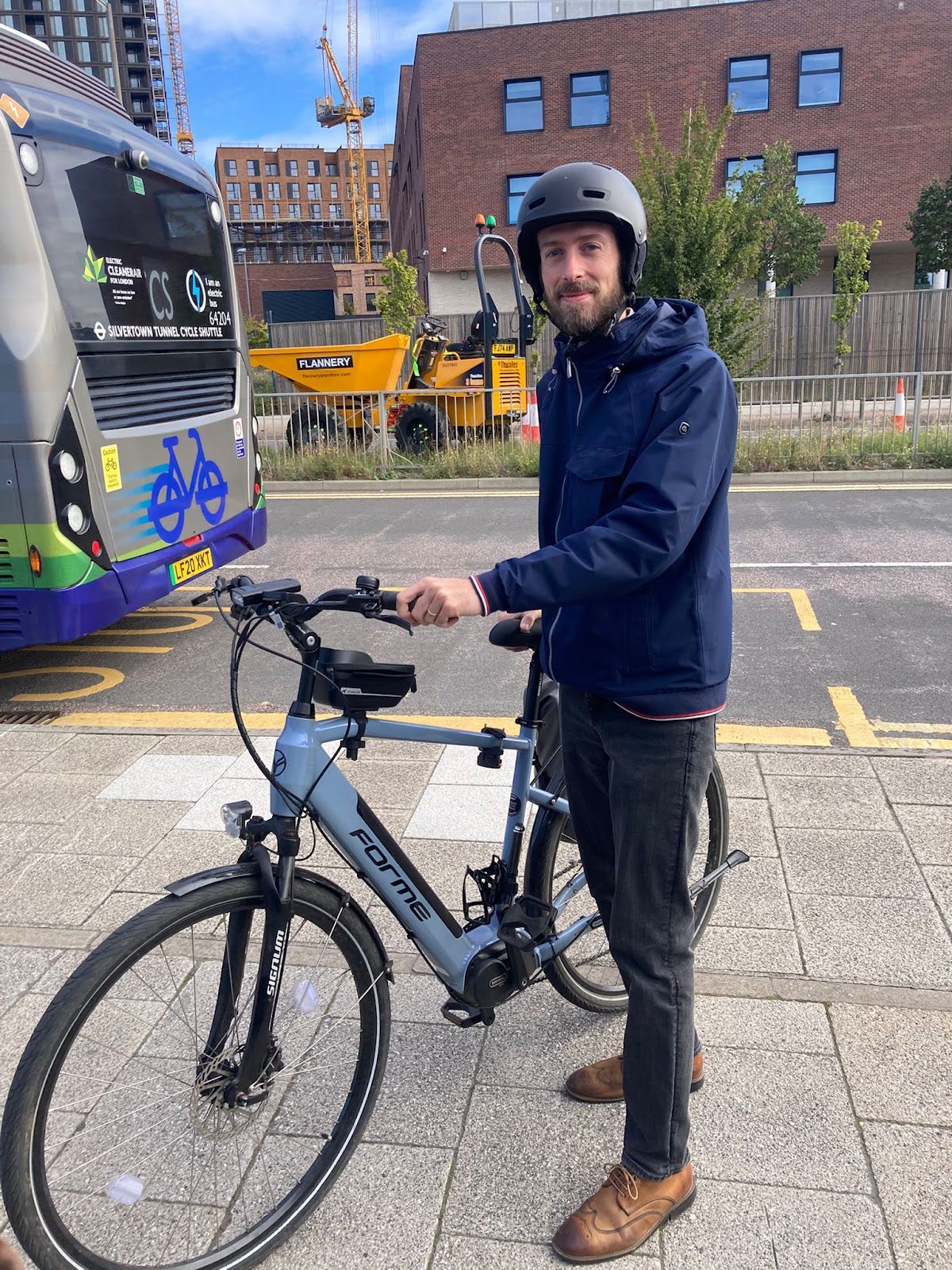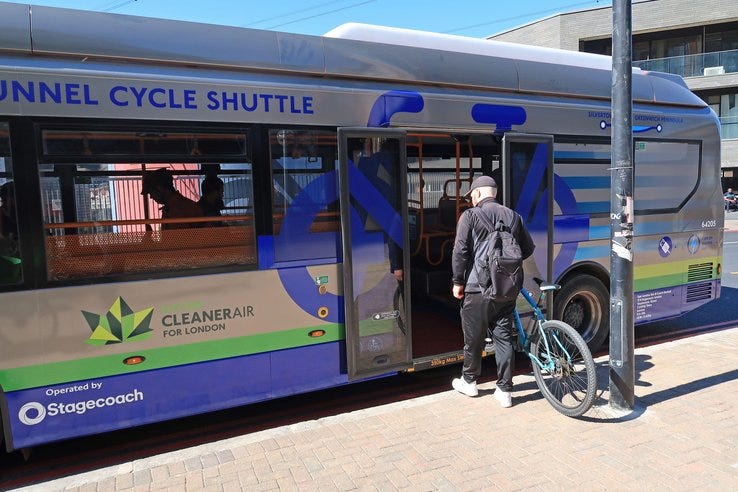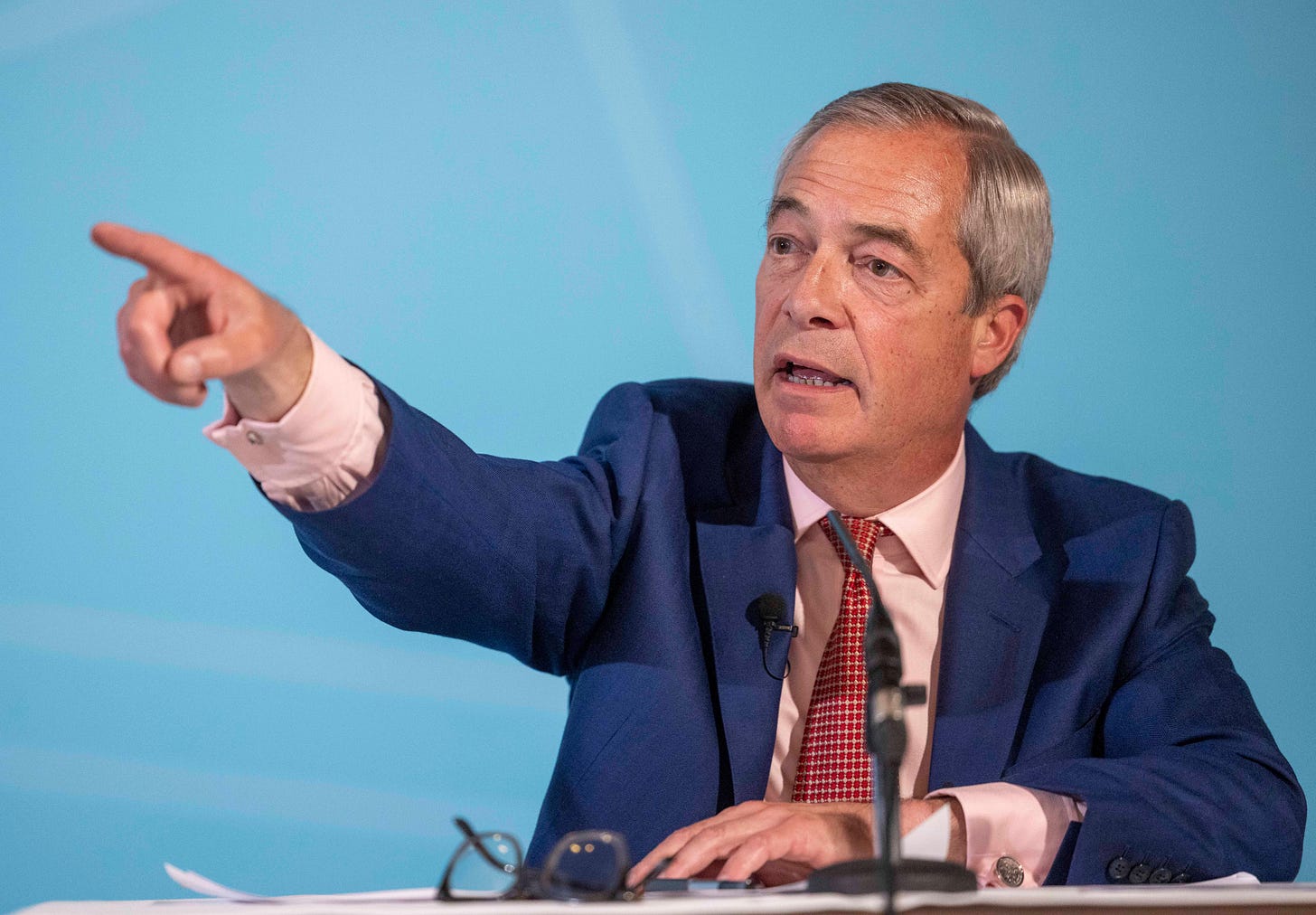100,000s of Londoners could be deported under Reform's plans
Plus: Transport for London's cycle bus that costs £40 a passenger, a curious oligarch dream mansion in north London, and the Sadiq Khan/Trump non-response response.
A lot of political news coverage focuses on the characters and the egos rather than the impact of actual policy. But today I want to look at the real world result that Reform’s proposed immigration policy would have on London.
As a city with a massive immigrant population, there is nowhere in the UK that would change quite so dramatically should Nigel Farage find himself in Downing Street.
Scroll down to read how London’s population would be impacted if Reform implemented the immigration policies they announced this week.
Khan’t get you out of my head.
If Sadiq Khan is worried about his status under a Labour government, which is proving reluctant to hand generous funding deals to the capital, the mayor of London can always rely on one thing: He lives rent-free in the head of the world’s most powerful man.
Donald Trump used part of his rambling address to the United Nations yesterday afternoon to criticise Khan. The US President forced the world’s diplomats to listen as he delivered a view of London that seemed more influenced by online viral videos than the day-to-day reality of life in the capital.
"I look at London where you have a terrible mayor, terrible, terrible mayor and it's been changed, it's been so changed," said Trump. "Now they want to go to Sharia law. But you are in a different country, you can't do that.”
This came shortly after Trump’s grumblings about Khan during his state visit, during which the president claimed he personally banned the London mayor from a state banquet. The mayor’s team claim Khan had never sought or expected an invite.
Trump’s criticisms of the mayor are a massive political boost to Khan, given the US President’s unpopularity in the UK.
“We are not going to dignify his appalling and bigoted comments with a response,” responded Khan’s team, before rapidly sending reporters graphics showing how London’s murder rate is a fraction of that in the United States.
If Trump has learned anything, it’s that while Londoners are allowed to criticise the state of London, nothing brings them together more than criticism from outside.
Transport for London is spending £40 on each cyclist it transports under the River Thames.
The new cycle shuttle bus under the River Thames is costing more than £40 for each cyclist it carries through the new Silvertown tunnel in east London, between the Greenwich Peninsula and windswept docks near City Hall.
The shuttle bus was introduced in spring as one of the conditions of building the new road link, in order to head off criticism that Transport for London was prioritising cars by failing to build any new cycle link. As a result Sadiq Khan announced there would be an experimental bicycle bus for the first year, which will carry cyclists and their bikes under the river free of charge.
Transport for London estimates that around 130 cyclists a day are using the service, which runs every twelve minutes from 6am to 9pm. Transport operator Stagecoach is being paid £1.97m a year for the contract to operate three specially-adapted buses.
On the basis that it is on track to hit 47,500 journeys, each trip is being subsidised to the tune of £41.50. It would be cheaper to allow each cyclist to expense a black cab for each journey.
When London Centric visited on Tuesday morning, we encountered only two other passengers across four bus journeys. One driver said he’d picked up “twenty people” this morning, with a small core group of regular cycle commuters.

Dominic Leggett from the Stop Silvertown Tunnel group, which argued against its construction, said: “The bus was as badly planned as the tunnel itself”.
Hundreds of cyclists rode through the tunnel on one evening during an illegal Critical Mass ride earlier this year. Plans for a nearby cycling bridge in east London between Rotherhithe and Canary Wharf were dropped on cost grounds.
A TfL spokesperson said: “Thousands of cyclists have already benefited from this new, free service since it launched on 7 April.”
Acknowledging the somewhat eccentric mode of transport, they added: “Given its innovative nature, TfL continues to raise awareness and promote the service through its marketing campaigns, we hope that as people become more aware of the service and how they can incorporate it into their journeys, more cyclists will use this service.”
Preposterous property of the week
This week we bring you a “grand and imposing” yet “paradoxically homely” nine bedroom home in north London. Round Hill has recently been put on the market for a mere £50m. It overlooks Highgate golf club, just near Kenwood House at the north end of Hampstead Heath, with neighbours including a number of well-connected Russian businessmen. The building includes a three-bedroom staff quarters. If you’re thinking of spending £50m on the property, do make sure you can also afford the council tax of £4,416 a year to support local services.
Some people would stop and simply gawp at the interior decor of the building with a “Roman indoor pool”. What’s more intriguing is to dig into who currently owns the building, oversaw its reconstruction, and is now hoping to sell it.
According to property records, in 2018 the house was transferred to a New Zealand subsidiary of a high-end Luxembourg wealth management business, hiding its true owner. But planning documents suggest the man with the £50m house is an individual going by the name of Vladimir Sloutsker. As ever with London, if you work out who owns the property you find an interesting story. (And some bad taste photos.)
As I was writing this edition I found out that London Centric has been nominated for The Hugh Cudlipp Award for the best campaigning journalism in the UK during the last year.
The four nominations for the prestigious prize, awarded since 1984 by the British Journalism Review, went to the BBC’s Investigations Unit, The Times, the Daily Mail and, er, this tiny start-up news outlet that you’re reading. The judges said that London Centric “offers hope to the future”. Huge thanks to all the paying subscribers who make it possible.
How Reform’s immigration plan would put “hundreds of thousands” of Londoners at risk of deportation.
Reform’s proposed changes to immigration law could result in hundreds of thousands of Londoners facing deportation after losing their right to live in the UK, according to both a leading economist and estimates from City Hall.
Nigel Farage on Monday pledged that a Reform government would revoke the existing “indefinite leave to remain” status if his party wins a majority at the next general election. This is a status that can be attained by people who have lived in the UK for five years and provides a permanent right to work, live and study in the country. It can either be an end in itself, or a route to full British citizenship.
London Centric has been told Reform’s immigration plan could result in:
As many as 1 in 10 Londoners finding their immigration status at risk. Those that fail to secure a new legal status would face deportation, posing enormous change to the city’s population, culture and how it operates.
Londoners would be disproportionately affected by the national policy as the capital is one of the main destinations for immigrants to the UK, with 40% of the city’s residents born overseas.
Longterm London residents from countries that do not allow dual citizenship, such as India, are likely to be particularly impacted by the policy.
“All Londoners… would be poorer as a result.”
Attempts to work out the precise impact of Reform’s policy on the capital are difficult because there is no official breakdown on which areas of the UK have most people on indefinite leave to remain. Reform has also briefed that they will not apply the policy to people on European Union passports who settled in the UK pre-Brexit.
Jonathan Portes, a professor of economics at King’s College London who has been critical of the financial estimates that underpin Reform’s pledge, told London Centric the policy would, at a minimum, affect “hundreds of thousands of Londoners".
He said it would damage the capital’s economy by reducing the attractiveness of the city for “key high-productivity sectors” such as finance, IT, and higher education. “All Londoners, not just the majority of us who are of migrant origin, would be poorer as a result,” argued Portes.
Sadiq Khan’s City Hall went further and suggested “as many as a million” Londoners could be directly affected by Reform’s policy, equivalent to around a tenth of the city’s entire population. That’s based on extrapolating national figures on the number on the path to indefinite leave according to where migrants settle in the UK.
“These proposals create significant uncertainty for Londoners who make a critical contribution to our economy and culture,” said a spokesperson for the mayor.
Portes also said Reform’s policy would disproportionately affect Indians who have moved to the UK as India (along with other populous nations such as China, Japan, and Indonesia) does not allow dual citizenship. This means many Indian residents of London retain their birth nation’s passports while living in the UK using indefinite leave to remain status, which they believed was secure for life.
Is Reform’s plan even workable?
Sophie Barrett-Brown, senior partner at law firm Laura Devine Immigration, said: “In terms of impact, London would of course be the worst affected [areas of the UK] as the main centre for migrants, particularly skilled migrants.”
Nigel Farage told reporters a Reform government would instead introduce a five-year renewable visa with a big salary threshold and higher English language requirements. New migrants would have to regularly reapply for the right to remain in the UK.
This policy, Barrett-Brown said, would dissuade “skilled workers, CEOs and scientists” from moving to London: “It would also have a financial impact in terms of tax intake… It’s all predicated on the notion that they think everyone who gets indefinite leave is on benefits, but, in reality, they are actually overall net contributors.”
Reform argue that removing the status would reduce the number of migrants coming to the country and relying on benefits, although the underlying figures have already been retracted.
However, Barrett-Brown cast doubt on whether Reform would actually be able to deport people en masse. “There would be so many legal challenges, that it would really affect their ability to implement it,” she said. “Why on earth would you come to London or the UK if your right to stay could be revoked at any point? That undermining of confidence would really affect people’s will to come here.”
Alternatively, according to Bloomberg News, Farage briefed journalists that migrants could apply for British citizenship after seven years — but would have to renounce their other passport and could no longer become dual nationals.
Who are the Londoners who will be affected?
At the moment many migrant workers or students are enticed to London through legal immigration routes, in the hope that one day they could be able to make the capital their permanent home. Under Reform’s plans migrants would find themselves reliant on rolling temporary visas, a system that has more in common with the approach taken in Dubai where many businesses are reliant on cheap overseas labour.
One impact would be the potential loss of skilled overseas NHS workers who do not meet the income threshold. Trinity is an NHS psychologist who is originally from Canada but has been in the UK for eight years on a mixture of student and work visas. A resident of Kennington in south London, she had planned to apply for indefinite leave to remain in two years time.
When asked about Reform’s plans, Trinity told London Centric: “It seems like there’s a strict salary cap, but if you work for the NHS you don’t normally meet those caps, which is why you have health and care visas. It’s not clear to me that there would be any clear route for me to stay as an NHS worker who is in a lower income band.”
She added: “It’s hard because my whole life is here, I’ve been here since I was 18. But of course, you want to try.... It's definitely making me reconsider how hard I'm trying to stay in the UK.”
Aisha, a young woman from the Middle East who lives in north London, told London Centric that she has lived in the UK for the last six years. She is in the process of applying for indefinite leave to remain: “It’s very terrifying, waking up to Reform saying we’re going to deport you all.”
London’s politicians have to work out where they stand.
Reform is currently ahead in national polling and Nigel Farage becoming prime minister is a plausible outcome, aided by the 15% of Londoners who say they would vote for the party if an election was held tomorrow. The party is also hoping to make gains in next year’s local London elections.
Sadiq Khan has spoken up in defence of the many thousands of Londoners who have indefinite leave to remain, saying “They have legal rights and are our friends, neighbours and colleagues, contributing hugely to our city. Threatening to deport people living and working here legally is unacceptable.”
However, the mayor would have no power to stop immigration policy from central government being enforced. In addition, the current Labour government is planning to double the amount of time it takes to attain indefinite leave to remain from five to ten years, in a bid to see off the political threat of Reform.
The Conservatives find themselves caught between their pro-business and their anti-immigration factions. Susan Hall, the party’s leader in the London Assembly, has repeatedly shared positive posts about Rupert Lowe MP who is seeking mass deportation of illegal migrants.
Asked for a comment on Reform’s policy and the potential deportation of hundreds of thousands of workers, Hall told London Centric:
"Reform's immigration announcement reflects a growing belief in the UK that the pendulum has swung too far in one direction on immigration in the last few decades. Whilst I do not agree with how far Reform has gone, we must recognise the very real concerns that people have about the scale of immigration in our country and how those arriving in the UK interact and engage with our communities and our systems.
We want an immigration system where high-value talent, net-contributors to our system are able to make a lasting impact on our economy, especially in London in our business and financial sectors. This talent will no doubt be questioning their future in the UK under these proposals.
But at the same time we must also make sure that our immigration system does not become a backdoor for people in low-paid work to arrive in the UK with dependants and become a cost to British workers and the state.
London has the most international population of any city in the UK, a fact that has not escaped the notice of many Reform voters. Whichever way Londoners vote in 2029 should Nigel Farage end up in Downing Street, their city may well be changed enormously by his party’s immigration policy – financially, culturally, and socially.
If you want to get in touch with London Centric then message us on WhatsApp or email — or click below to leave a comment.







Farage should never ever be near Downing Street. He is dangerous to the country.
Congrats on the nomination. You deserve it!